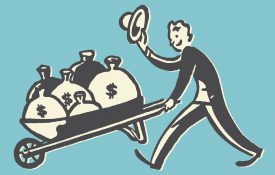-
Susan K. Nolen-Hoeksema
Yale University James McKeen Cattell Fellow Award Susan K. Nolen-Hoeksema died following heart surgery early in 2013, leaving behind a legacy of groundbreaking research on mood disorders. She was recognized internationally for her work on how people regulate their feelings and emotions. She showed that certain thinking patterns can make people vulnerable to emotional problems like depression, and can slow their recovery from them. Nolen-Hoeksema pioneered research on rumination, and how it interferes with people’s ability to solve problems and obtain help from others.
-
Anthony Greenwald
University of Washington William James Fellow Award A renowned expert on human cognition, social psychologist Anthony Greenwald’s work has led to the discovery and documentation of unconscious and automatic thought processes that most people would rather not possess. He ingeniously has taken what had once been a pariah of psychological science — subliminal perception — and turned it into a respectable area of research and even a gold mine for others to excavate. In 1995, Greenwald and his collaborators, APS Past President Mahzarin R.
-
Linda Bartoshuk
University of Florida William James Fellow Award Linda Bartoshuk is an international leader in taste research and a pioneer in developing new methods of psychophysical scaling. Her brilliant work has focused on the genetic variations in taste perception, and how that perception affects overall health. Bartoshuk was the first scientist to discover that burning mouth syndrome, a condition experienced mainly by postmenopausal women, is the result of damage to the taste buds at the front of the tongue and not, as was once commonly believed, a psychosomatic condition. But perhaps she is best known for the discovery of supertasters — individuals who have more taste buds than most people.
-
Stop and See Milgram’s ‘Shock Box’
It’s been more than 50 years since Yale psychology professor Stanley Milgram began his groundbreaking experiments on obedience to authority when ordered to harm others. His infamous “shock box” embodies one of the most famous, controversial and, important series of experiments of the 20th century. Attendees at the 25th APS Annual Convention, to be held May 23-25 in Washington, D.C., can see the “shock box” up close. Milgram’s Simulated Shock Generator is making the trip from the Center for the History of Psychology at The University of Akron down to Washington, DC and will be on display in the Exhibit Hall in booths 302 and 304.
-

Can Happiness Lead to Thievery?
A psychological study suggests that happy people may have an easier time in justifying their own immoral behavior.
-
Student Events at Convention
Here is a quick day-by-day rundown of student-related events that you don’t want to miss at the 25th APS Annual Convention, May 23-36 in Washington, DC. Make sure to follow APS on Facebook and on Twitter and Instagram using the hashtag #aps2013dc. Thursday, May 23 9:00 PM - 12:00 AM APSSC Convention Kickoff and Student Social at Uptown Tap House Want to meet other students? This event gives the APS Student Caucus an opportunity to welcome student affiliates and provide information about all of the great student events at the convention. Students will be able to relax in a casual environment and meet other students who share the same interests.

